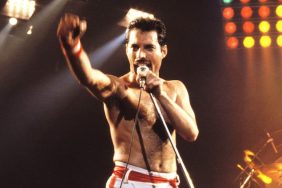
CraveOnline: How has the reaction been? You heard my reaction, and it was not your own. How has the reaction been from other people so far? What seems to be the takeaway people are taking from it?
Brett Morgen: I’m humbled beyond the words at the reaction to the film. I think that the reviews have been almost across the board beyond what I would have expected, because the style of my movies are very different. [Some people] are resistant to my presentation or my form, because I don’t do talking heads and I don’t spoon feed everything. My movies are meant to be more experienced than learned, and so inherently there’s going to be people who don’t appreciate that approach.
With this film I found, across the globe, the global reaction to be just humbling. Beyond that, I think, we had a screening a couple nights ago at the Sundance Resort, and following the screening a young woman, about 22, was wearing a Nirvana shirt, came up to me and told me how she was a recovering addict and how she had contemplated [or] tried taking her life on a couple of occasions, only to wake up from that feeling like a total failure, like she couldn’t even [commit] suicide right, and [she said] the experience of seeing the film had inspired her, or motivated her, to move forward on her journey and to never touch heroin again.
Wow.
So that, to me, is worth a hundred four-star reviews. It’s worth more than the film, and it goes to back a conversation I had with the family when they saw the film for the first time. Wendy Cobain said about the film, “There were things in this movie that no mother should see. There were scenes in this movie that Kurt would not want you to see. He wouldn’t want you to see them having sex. He would not want you to see him strung out on heroin.”
And Kurt’s sister said, and this is after the movie, she said, “My brother was so ashamed of his heroin use. Do you really think he would want that in the film?” And I said, “I think if Kurt knew…” I said, “Look, for the last 25 years we all knew Kurt did heroin, but we never saw the effects of it. So in a way it’s been sort of romanticized. It’s like Kurt Cobain is associated with heroin chic because we never saw it, the ravages. And then you see the film and you’re confronted with it, and not only confronted with it but in that moment when he’s holding Frances you see the struggle. You see that he wants to be a doting father but he’s losing his battle to his addiction. And not only is it not going to inspire or influence anyone to do heroin, I think it actually does the opposite, and what if – 20 years after his death – Kurt’s legacy is to save a life? That there’s one person out there who sees this film and decides not to do heroin again? What greater legacy is there, posthumously, than to save a life? Given that, given that, if we asked your brother, I believe without a measure of doubt that he would choose to save one life rather than sell 100 million records.”
So when this woman approached me after the screening the other day it was a validation, and it was something that I felt Kurt was present for, if you know what I mean.
How do you respond to something like that?
Man, she followed up with an email yesterday that just broke me to shreds. Honestly, it was in a crowded room at the Sundance Resort and she said that and I embraced her, and tears were rolling down my eyes, and she walked off and someone came up and said, “Hey! I just want to tell you the movie’s…!” And I was like, “Um, excuse me one second,” and I stepped outside and walked out into the snow and just bawled for ten minutes because that’s so much more… I mean this whole experience, man, has been so powerful and heavy.
To start, first off, with Frances… which in and of itself that was really the initial goal. The thing about heroin or saving a life or not was a byproduct. Initially I set out to give Frances a couple hours with a father she never knew, because he took his life when she was two years old. She has no memory of him. I thought that, if nothing else, if I can give this girl a deeper understanding of who her father was and how much he loved her… well, that wasn’t the goal, to show her how much he loved her, because I didn’t know about it at the onset. But the two hours with her father that she never was able to have, that would be enough, and if that worked for her then somehow that would translate to a broader audience.
So when Frances saw the film the first time and expressed that sentiment, that it gave her a couple hours that she never had with her dad, to me that was the greatest achievement I could possibly arrive at with this film. This experience the other day just added upon it, and so I think the reaction has just been tremendous, man. I feel like… [Thinks.]
Yeah?
That Universal Pictures is releasing this film in theaters everywhere outside the U.S., so the film will be probably the most widely distributed documentary of the year, internationally, if not one of the two or three most widely distributed films… and it’s also a film that I had final cut on, so it’s a different type of movie. The fact that this movie is going to get out there, on the level that it’s going to get out there, it’s humbling and [I am] thrilled to take this film out there.
For 25 years, man, people have been walking around with Cobain shirts on, or Cobain posters in the dorm room, and those images of Kurt were really a projection, a fantasy. My hope, now that I’m done, is not that people will take those posters off the wall or throw those shirts away, but that they’ll have a better understanding of what that means, what that’s representing, and they’ll want to wear it even more. Because I feel that once you get to know Kurt the way we get to know him in the film, you like him even more than you did before, and you understand him more.
It’s sort of like, when make something like this generally one of two things happen: you either put someone on a pedestal or you tear them down. We were trying to do neither. We weren’t trying to put him on a pedestal and weren’t trying to tear him down, we were trying to look him in the eye.
William Bibbiani is the editor of CraveOnline’s Film Channel and the host of The B-Movies Podcast and The Blue Movies Podcast. Follow him on Twitter at @WilliamBibbiani.








